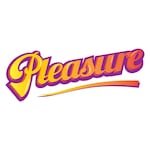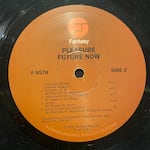This past September, the Portland band Pleasure played together for the first time in almost 40 years. The long-awaited show at Portland’s Revolution Hall felt like a celebration with close friends.
“It felt strange but it felt really, really good after all these years to get up there,” bass guitarist Nate Phillips said. “To just enjoy the idea that here we are on stage together playing these songs.”
Even though the room at Revolution Hall is big, the show felt small and intimate. There was plenty of room for fans to dance in the aisles. Pleasure once shared big stages with big names including The Commodores, Kool & the Gang and Earth, Wind & Fire. Their sound influenced Questlove, Janet Jackson and countless others. The band split up in the 1980s, and there have been other reunion attempts since, but the show this fall was different.
“Although you could technically count the reunion show that we did at the Mount Food Jazz Festival in 1995, it’s not really a Pleasure show because there were no Pleasure vocalists,” keyboardist Michael Hepburn said. “Compare that to Revolution Hall where we played a huge number of recorded material and material we’ve never had a chance to play.”
Four of the original members were there performing along with two newcomers. They were joined on stage by other musicians including vocalists, a trombone player and trumpet player. There has even been talk of taking the group on tour.
“The fans are still responsive. They knew the songs and were singing along,” Phillips said. “They were extremely supportive of every note we played.”

The band Pleasure on stage at Revolution Hall in September 2023. It was the first time in 40 years that the band played together.
Paul Marshall / OPB
Where it all began
Pleasure originally formed in the late 1960s when two different bands made up of Portland high school students combined: The Soul Masters and The Franchise.
In 1968, keyboardist Donald Hepburn (Michael’s brother) put together a quartet for the Jefferson High School Soul Assembly, held at the then Civic Auditorium (now Keller Auditorium).
“The band would begin to grow and include musicians from around Portland who would sit in and play,” said Donald Hepburn, whose group became known as The Soul Masters.
Eventually The Soul Masters wound up playing at a legendary Portland jazz club called The Upstairs Lounge. It was there that they met The Franchise.
Members of The Franchise grew up trying to emulate the records they heard at each other’s houses. They made their own drums and guitars with cardboard and strings, and eventually graduated to the real thing.
When Michael Hepburn first saw The Franchise at The Upstairs Lounge, he thought they had a sound he wanted to aim for. “It was a beacon that pointed in a direction of the way that we wanted to have an ensemble of people play,” said Hepburn.
In 1972, Michael Hepburn came across an advertisement for JB Scotch Whiskey, which was described as a “rare pleasure.”

an image of logo from the Portland band Pleasure
Courtesy of Pleasure Music Group
“I thought: ‘That’s what people want, it’s what they want from music,’” said Hepburn, who realized it would be a good name for the combined bands. “I offered it up. Everybody had a vote and thought if it had a name and hook then it’s good.”
Pleasure began playing at The Upstairs Lounge regularly in the early ‘70s, where they met a lot of musicians traveling through Portland.
“We’d be on stage then Lakeside would come in or the Whispers,” Phillips remembers. “Every time Grover [Washington] was in town, he’d start playing on stage.”
The relationship with Grammy-award winning saxophonist Grover Washington proved to be instrumental for Pleasure. It was Washington who told the band to send their demo tape to Wayne Henderson, one of the cofounders of the influential band the Jazz Crusaders (later The Crusaders).
“Wayne came and listened to us,” Michael Hepburn said. “He came to the music studio early in the morning after a Crusaders gig.” But Henderson couldn’t do much with a band based in Portland.
So the band members bought an old white Franz Wonder bread truck for $200 and made the trip to Los Angeles with their equipment. They traveled in the summer of 1974, since some of the members were still in high school and had to receive permission from their parents.
Pleasure played at the Whiskey A Go Go on Sunset Boulevard, where Henderson had arranged for all the major labels to attend the show.
“Wayne told us the major labels were going to be there in the audience and we were kind of nervous,” Phillips said. “We got on stage and played ... I don’t think we had a great show. It wasn’t our best night. Wayne agreed. He said ‘The show was terrible.’ He went out to the audience and he came back with this gentleman. His name was Ralph Kaffel.”
Kaffel, the president of Fantasy Records, apparently had a different view of the band’s performance that night — he signed the group right away.
The band’s reputation slowly built following the success of their records on the chart. Their fifth album, “Future Now,” was released in 1979 and really helped to cement their legacy. The biggest song on the album was called “Glide.”

An image of the Future Now album from the band Pleasure. This is the groups' fifth album which features the song Glide
Steven Kray / OPB
“When the record came out and feedback came back: Everyone likes “Future Now” but everyone seems to really like the last song called ‘Glide.’” Phillips said. “We were just making records the best way we knew how and that song seemed to stand out.”
Pleasure’s success was massive. They headlined in Philadelphia over Harold Melvin and the Blue Notes who at the time were a major international act from Philadelphia. During that show, Grover Washington came out and played with Pleasure on stage in a full circle moment.
‘We just owe it to them to get out and play’

A tour poster on display at Portland's Revolution Hall. The band Pleasure played live last September for the first time in 40 years.
Paul Marshall / OPB
Pleasure’s work is still being used and sampled in film, television and music. In Questlove’s 2021 book “Music is History,” he mentions the song “Glide” and its impact on him. He included two versions of “Glide” on the curated playlist for former First Lady Michelle Obama’s book tour for her 2018 memoir, “Becoming.” Artists like Janet Jackson, Daft Punk and others have sampled Pleasure’s work.
The band hopes to play more shows in the future, but the show at Revolution Hall was a big step for Pleasure.
“A lot of those songs were memory stamps of what [the people in the audience] were going through during their life at a certain time in their lives,” Phillips said.” They missed that and I didn’t quite understand until after the show. They’re reliving aspects of their lives that hopefully helped them or help them feel a certain way about what they were going through. We just owe it to them to get out and play.”
Pleasure is working on making songs from the Revolution Hall show available to listen to via streaming.
Dear Reader,
For more than 100 years, OPB has offered reliable news and connection. Through wildfires, elections and economic downturns, OPB has been there to inform and connect our communities. Today, journalism faces new obstacles.
But this work is only possible because of people like you — readers who turn to articles like this and continue to engage with independent journalism in our community. If OPB has been a part of your life, if it has helped you see your community or the world more clearly, please consider making a contribution today.
— The OPB Team
Please select an amount to give. Your contribution ensures that fact-based reporting, cultural connection, and stories that strengthen our community remain freely available to everyone.



